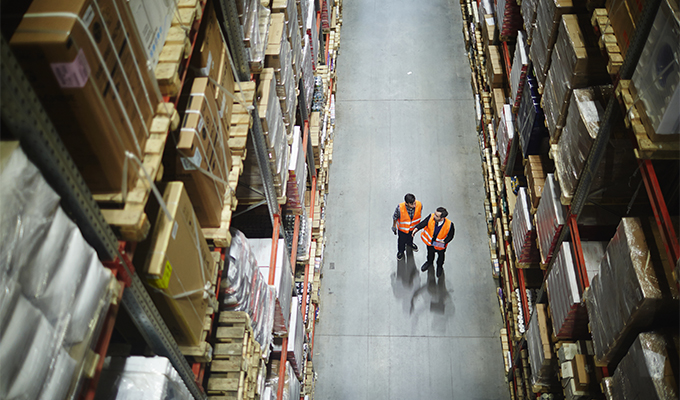Between delays and sold-out supplies, today’s supply chain has completely changed the game for contractors. Beating supply chain challenges is about implementing creative solutions that get customers what they need while navigating shortages and shipping delays. Flooring contractors can overcome supply chain issues with a few key strategies.
How Flooring Contractors Can Overcome Supply Chain Issues
Flooring contractors have some tools in their belts for solving supply chain challenges. While it may not be possible to fix the situation, there are some great ways to mitigate the adverse effects of shortages and delays. These six solutions may be the perfect place to start.
1. Plan for Delays and Replacements
One of the first things flooring contractors can do to overcome supply chain challenges is to plan for delays and replacement materials from the start. It’s no secret the construction industry — particularly the home building industry — is struggling with supply chain delays. Customers are likely already aware of the situation.
When you are upfront with customers about delays from the beginning, it sets more achievable expectations and reduces the likelihood of a negative customer experience. Additionally, you may want to work with customers to select alternative materials during the planning process. This way, you can easily fall back on other options if a customer’s first choice takes too long to restock.
2. Focus on a Smaller Pool of Products
It may sound counterintuitive, but offering fewer product options to customers may help you stay on schedule. Offering less allows you to focus on keeping those items in stock. It also makes it more likely customers will choose specific materials, so you can order those in bulk when they are available without worrying about them going to waste.
The great thing about this strategy is it doesn’t deprive customers of customization options. It simplifies things on the contractor’s end without negatively affecting the customer experience. If you notice one flooring product is becoming increasingly difficult to find, simply remove it from your offerings and replace it with something else.
3. Shift to Alternative Materials
Contractors must be willing to try doing things differently to overcome supply chain issues, including considering alternative materials. You may be used to using certain materials like conventional concrete in your projects. However, with supply chain challenges making those popular standard products more and more difficult to find, you can dodge supply shortages by simply opting for something else.
For instance, you could use cement board instead of traditional drywall. This is a perfect case of alternative materials functioning better than conventional options. Compared to drywall, cement board is more moisture resistant, stable, easier to install, and holds its shape better over time.
Since other contractors may jump straight to drywall, there is less competition for more innovative solutions like cement board and other next-gen building materials. You can even opt for sustainability-focused alternatives, such as bamboo flooring in place of wood.
4. Try Reclaimed Materials
One particularly unconventional alternative to traditional materials is reclaimed building materials. Reclaimed or recycled materials are recovered from other sites, such as older demolished buildings. Rather than letting these materials go to waste, contractors can reclaim them to clean up and use in new projects, often for much less money than new materials.
For instance, you could reclaim brick and stone to make rock aggregate for patios or garage flooring. In some areas, you may even be able to snag barely used materials from film sets and local events. Architects at the Georgia Institute of Technology reclaimed 25,000 feet of wood from film sets around Atlanta, which builders used for a large part of the flooring in the Institute’s new Kendeda Building.
5. Consider Alternative Suppliers
Many flooring contractors source materials from overseas. Unfortunately, this is contributing to supply chain challenges. To overcome supply chain issues, you may have to consider shifting to alternative suppliers. In particular, domestic and local suppliers could save you time and money instead of waiting on delayed shipments from overseas.
These suppliers may have fewer options or higher prices, but they could be worth it when you have materials on time. As mentioned above, having a smaller pool of products to work with can be helpful so restocking is more streamlined. Even bespoke suppliers can be a great option, particularly for more luxury projects where things like custom tiles are within reach.
6. Implement Automation On-Site
It is worth considering construction automation to mitigate delays created by supply chain challenges. While some technologies for the flooring industry may not be mainstream for a few more years, it is still unclear how long supply chain delays could last. So, investing in automation technologies now could help your team get ahead.
For instance, you could use a brick-laying robot to speed up brickwork installation for outdoor floorings. Behind the scenes, you could also use software to automate your materials purchasing to ensure you get key materials as soon as possible. Automation can give you an efficiency boost that makes up for some of the time lost to lengthy shipping times or restock waits.
Tackling Supply Chain Challenges
Supply chain challenges may be frustrating, but flooring contractors can take action to minimize the negative impact. You can overcome supply chain issues by getting creative and exploring new materials and suppliers. Simplify purchasing and restocking by sticking to a smaller but higher-quality pool of products. Remember to be upfront with customers about potential delays as well. These tactics can help flooring contractors build a better customer experience amid a turbulent supply chain.
About the Author
Emily Newton is an industrial writer who specializes in covering how technology is disrupting industrial sectors. She’s also the editor-in-chief of Revolutionized where she covers innovations in the industry, construction, and more.


